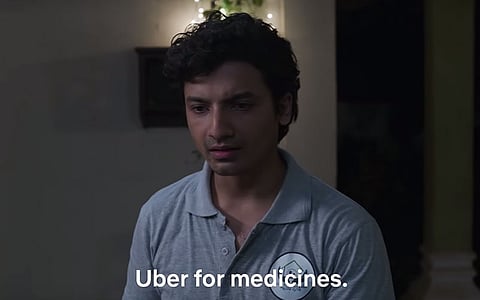
- In-Depth Stories
- Web Stories
- Reviews
- News
- FC Lists
- Interviews
- Features
- FC SpecialsFC Specials

Directed by: Udai Singh Pawar
Cast: Priyanshu Painyuli, Chandrachoor Rai, Shadab Kamal, Rajeev Siddhartha, Sheetal Thakur, Ninad Kamat, Swati Semwal, and Eijaz Khan.
Streaming on: Netflix
In Super Pumped: The Battle For Uber, writer and tech-editor for the New York Times, Mike Isaac, writes about the co-founder and former CEO of Uber, Travis Kalanick, a controversial figure. He was ousted from his position as CEO in June 2017 in a boardroom coup. A figure of deep divisions, he is often described as a sociopath, putting Uber on the global map, yet resorting to tactics of growth that were at best, questionable, and at worst, illegal. It was all seen as incidental to making a start-up really rev.
Netflix's Upstarts too is about the making of such a man, but in the Silicon Valley of India, Bangalore. His startup idea is called "Uber for Medicine", a nod to both the tech architecture and perhaps, also the social architecture of Kalanick's Uber. But the frame this film offers also is not nearly as edgy as Kalanick's story. The roughness of the ambitious Kapil (an earnest Priyanshu Painyuli) is smoothed over by the buddy-film template, and a love story that isn't quite about love as it is about familiarity.
It takes a while for the film to find its groove. As a result, the first hour feels like an anesthetic viewing- where you are registering the plot points, but really, nothing moves you as a viewer. Sample the scene where Kapil is supposed to be inspired by a speech about hope. The scene never climaxes to the point where you, as a viewer, feel the hope brimming in Kapil's heart. You have merely registered a fact: Kapil has been inspired.
It is when the conflict is generated- of the over-ambitious Kapil unwilling to look back at why he started the company, but only looking forward to capital blooming in the murky waters of the startup ecosystem, that the film builds into a cinematic rhythm. The dialogues are written with economical ease that is rare and breezy, reminiscent of another startup film, Rocket Singh: Salesman of the Year.
"Khula aasmaan, sasti daaru, ghatiya dost, aur kya chahiye?"
"Sewa shuru kar, mewa apne aap aa jayega."
But the conflict sags, the alcoholic friend's (Chandrachoor Rai) genius dammed by fear of Parkinsons feels overplotted, while that of the spiritual one (Shadab Kamal) feels under-developed. Beyond a point, the film stops being about the startup world. Kapil's moral compass needs rectifying, and that is what the focus of the film becomes.
It is possible that the film doesn't quite want to move you much as a viewer. The demands of a streaming film, afterall, are different from one seeking a theatrical release. The obvious demand of being entertaining aside, there is often an assumption that such films are watched in parts, during transit to and from work, or at home in between chores and the structure of streaming films must take that into account. (Like how in Ekta Kapoor soaps, the mutliple shots of the same slap or long shots of people walking in was made to accommodate the housewives watching the soap between chores) I might be entirely wrong about this hypothesis. But I wonder what it is about Netflix films that refuses to be more than the sum of its parts. You won't be bored, but you won't be moved either. Is that good enough?